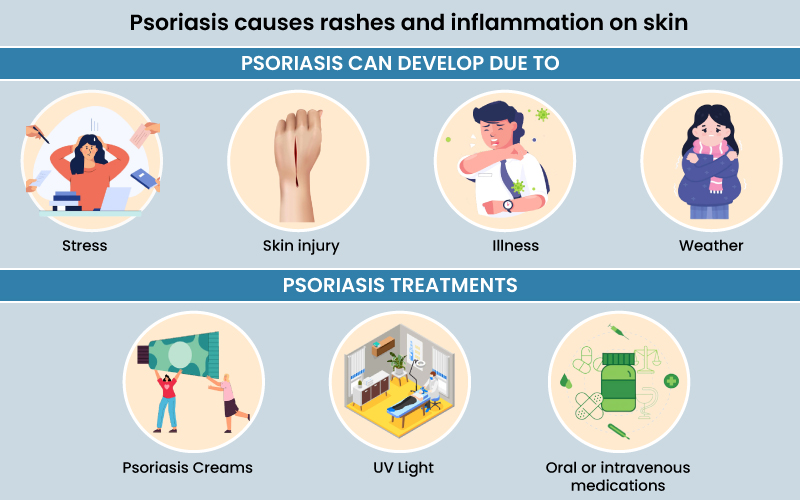Get 10% Off*, Use Code: HPE10
Get 10% Off*, Use Code: HPE10

Psoriasis is a condition that causes rashes and inflammation on the skin. It is an auto-immune disease with patches of discolored skin covered with scales. Although these patches may appear on any body part, they mostly develop on the elbow, knee, and scalp. These thick and scaly areas are called plaques. Psoriasis happens because of rapid skin cell growth. Generally, our skin cells grow and shed in a month, but in psoriasis, the duration of this cycle is reduced to 3-4 days. Instead of shedding, the old skin accumulates on the skin's surface and may burn, itch, or sting.
The inflammation caused by psoriasis can also impact other body parts. One of the associated conditions is Psoriatic Arthritis which causes swelling, stiffness, and pain in the joints and the surrounding areas.

There are several different types of psoriasis which can affect multiple locations on the body. Common sites are genitals, scalp, face, hands, feet, nails, and skin folds.
The various types are known:
While psoriasis can start at any age, according to Psoriasis.org, it often starts between the ages of 15 and 25. Common symptoms of psoriasis are:
The symptoms also vary as per the type of psoriasis.
Psoriasis's exact cause is unknown, but we know that the immune system is responsible. The immune system is supposed to fight any alien presence in the body and protect it. The problem arises when the immune system mistakes the healthy cells for unknown entities and starts attacking them. This causes the inflammation in healthy cells to swell and turn into plaque. The over-active immune system changes the development period of new skin cells to 3-4 days instead of the regular 30 days, which causes deposits of old skin over the new skin.
Genes also play an important role. If a family member has psoriasis, there is a higher chance that you or a loved one might also develop this disease.
Early research suggested that the psoriatic skin contains a gene mutation. Later it was discovered that this gene mutation alone is not responsible for passing the disease to the family. Although genetic studies can now indicate the chances of a person developing this condition, there is no concrete answer regarding how genes pass this skin disease on to another family member.
Sometimes, psoriasis is triggered by certain other factors, including:
If you have severe symptoms, it is advisable to consult a dermatologist. Your doctor will determine the treatment depending on the type, severity, and area affected. There are 3 levels of treatment:
Topical treatment is the first treatment given for mild to moderate psoriasis. It includes:
Other treatments which can be helpful for psoriasis are:

Medline Remedy Olivamine Skin Repair Cream
Psoriasis has multiple effects on one's life, from deciding which clothes to wear and how to manage the symptoms to managing the skin condition and emotional, mental, and overall health. Psoriasis can affect relationships, and even going out in public becomes a challenge because of the itch and the appearance of the skin. To manage psoriasis and its effects, taking medication on time and regularly using moisturizers and creams is important. If the condition worsens, consult a healthcare provider.
Disclaimer: All content found on our website, including images, videos, infographics, and text were created solely for informational purposes. Our reviewed content should never be used for the purpose of diagnosis or treatment of any medical conditions. Content shared on our websites is not meant to be used as a substitute for advice from a certified medical professional. Reliance on the information provided on our website as a basis for patient treatment is solely at your own risk. We urge all our customers to always consult a physician or a certified medical professional before trying or using a new medical product.

Akanksha Nigam has been a Health Products For You contributor since 2021. With a Masters Degree in Finance, she began her Marketing career in the banking industry. However, her interest in human ...
How To Increase Iron Levels Quickly
It’s a question that must have puzzled you like many others. Iron is essential in hemoglobin production and its inadequate levels can negatively impact your health. Dive into this informative article to explore top iron-rich foods that can help you fight iron deficiency.
10 Best Coccyx Cushions for Tailbone Pain
If you're like most people, you spend about 8 to 10 hours sitting every day. However unhealthy, it is part of life for many, and can cause tailbone pain. Coccyx cushions can help alleviate this pain. Click to read more and find the perfect coccyx cushion for your tailbone pain.
5+ Best Adult Diapers for Fecal Incontinence
Dealing with fecal incontinence can be challenging, but you're not alone. Read this article and navigate through discreet and effective solutions that help you manage fecal incontinence and let you live life on your terms with confidence and comfort.
Top 5 Best Reviewed Nebulizers of 2024
Need an effective and affordable nebulizer? Look no further, in this article we offer 5 of our best reviewed nebulizers that are loved by our customers. Click to read more and find the perfect nebulizer for all your respiratory needs.
10 Best Penis Pumps For Erectile Dysfunction
For anyone dealing with erectile dysfunction, penis pumps serve as a great way to manage it. But with so many products available, determining the best one for your needs can be challenging. To assist you in refining your choices and making an informed decision, here are our top 10 options, recognized for their effectiveness and safety.